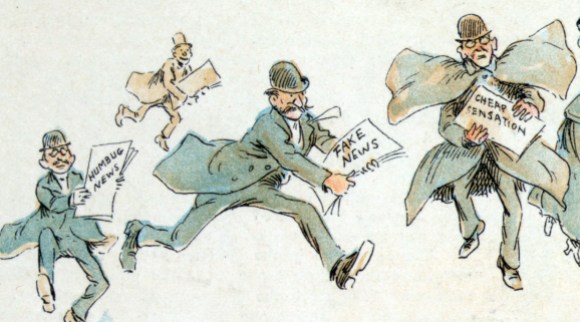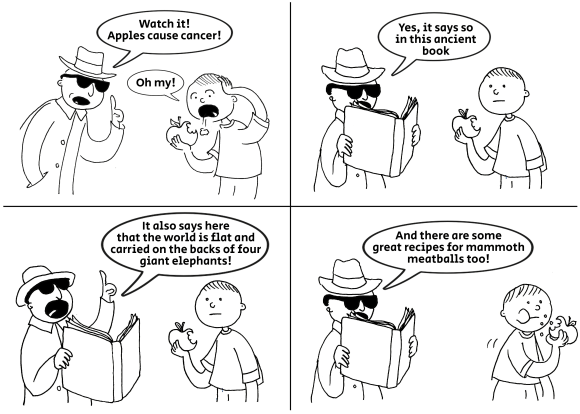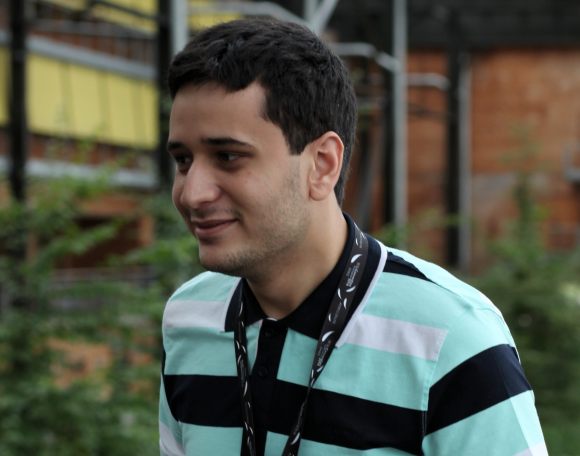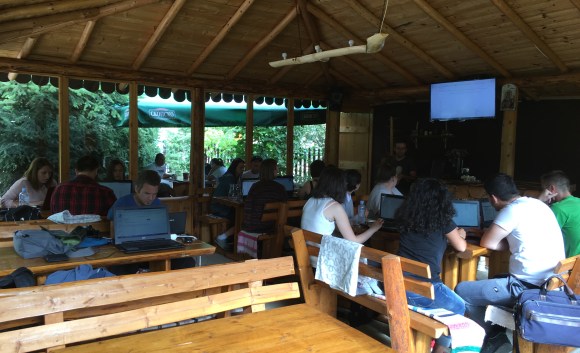
When you go online, how do you tell what is true and what is not?
The last decade has seen the rapid proliferation of websites peddling fake news, or the “yellow journalism or propaganda that consists of deliberate misinformation or hoaxes … [which] undermines serious media coverage and makes it more difficult for journalists to cover significant news stories.”
With the problem clear in hand, Wikimedia Israel—an independent chapter working to advance the Wikimedia movement in the country—is using an innovative approach to teach individuals to apply Wikipedia’s reliable source guideline to the internet at large. This guideline, which has been curated, expanded, and clarified by over a thousand editors since 2005, gives Wikipedians benchmarks for determining what sources are and are not suitable for use as citations in Wikipedia articles.
“Rather than feeling alarmed or confused by ‘fake news’ and ‘alternative facts,’ ” Wikimedia Israel’s Michal Lester and Dror Kamir state, “we are embracing this opportunity to re-check our basic concepts. The current climate provides a natural backdrop for Wikimedia Israel to take a plunge and provide some kind of tool to guide students, Wikipedia users, and the general public through basic notions of reliability.”

They started with a short paper that they circulated among Israeli academics, including the University of Haifa’s Sheizaf Rafaeli, who has worked with the chapter on a number of projects over the last few years and now serves on its board. However, the chapter quickly found that the method was not conducive to wider dissemination of their information.
So they instead turned to Racheli Rottner, one of the foremost comic artists in Israel who has a history of working in science-for-children productions. Like graphic non-fiction, the use of comics can help simplify complex and serious concepts for a variety of audiences. In this case, Rottner drew eight comic strips, none more than eight panels long. Wikimedia Israel believes that the use of comic has helped them reach younger readers, who are more used to consuming content in such a way.
Lester and Kamir described the resulting work:
Each of the comic strips demonstrates a characteristic of a non-reliable source, utilizing a recurring motif apples cause cancer, an unobjectionably false statement. One figure tries to convince another that this statement is true while using a basic logical fallacy or a misleading argument. The poor reliability of this figure is intentionally obvious, as it meant to lead the readers to the detailed explanatory text next to the comic strip, and makes them think how these methods are used in more subtle approaches, which they often encounter.
The comics are available in Arabic, English, and Hebrew, and the chapter says that other translations would be welcomed.
Ed Erhart, Senior Editorial Associate, Communications
Wikimedia Foundation
———
Wikipedia Library names Tunisia’s Houcemeddine Turki as the quarter’s Star Coordinator

The Star Coordinator program is a quarterly award to recognize the efforts of The Wikipedia Library volunteer coordinators. Houcemeddine Turki from Tunisia is the first Wikipedia Library’s star coordinator for the quarter of July–September 2017.
With this award, we are celebrating Turki’s passion to provide extensive content on Tunisia through adding adequate references and quality articles to Wikipedia. “The lack of online references about Tunisia has a negative impact on the quality of Wikipedia’s content about the country,” Turki explains.
The quest for a solution to this problem encouraged founding of the Tunisian Wikipedia Library, the first space for the Wikipedia Library in Tunisia. The project will provide offline and online local references to the Tunisian Wikipedia contributors supported by the Wikimedian-in-Residence at the Libraries of the Medinas of Tunis. The new space will also help with uploading old books in the public domain to Wikisource and adding OCR layers to them so that all Wikipedia users can use them as references.
“I found later that these libraries are also rich in the information about old Tunisian figures,” says Turki, “the history of Tunisia, the linguistics and history of the under-resourced languages of Tunisia. Knowing the value of these libraries and that not all Wikipedia users can reach these libraries, Carthagina Association (The co-organizers of the MedinaPedia project with Wikimedia TN User Group) had proposed Zeineb Takouti (who already works in the Diocesan Library of Tunis) to be a Wikimedian in Residence in the Libraries of the Medinas of Tunis. As a Wikimedian in Residence, Takouti helps provide digitized copies of the requested content from the libraries to the Tunisian editors via email.” He continues:
In 2016, I worked on a collaboration with Derja Association, that works on promoting the Tunisian dialect and culture on the internet, to develop the description of Tunisian Arabic on Wikipedia. References were a challenge but we found some useful ones in specialized libraries like the IBLA. We formed a team with Ramzi Cherif and Ramzi Hachani who helped provide us with electronic editions of the needed references from such libraries when we ask for them in the mailing list of Derja Association.
These initiatives were the first steps to creating the Tunisian branch of the Wikipedia Library. In 2017, I worked with the Wikimedia TN User Group, MedinaPedia users and active Derja Association members to reunify our group initiatives into a structured Wikimedia TN User Group. Consequently, the Tunisian Wikipedia Library was founded to provide access to the books and manuscripts (mainly old ones) existing in local libraries to Wikimedia users. Further than the functions that any branch of TWL can do (providing access to digital libraries and to needed references from offline libraries), this branch will work on uploading old books under free licenses to Wikisource and adding OCR layers to them so that all Wikipedia users can use them as references.
Felix Nartey, Global Coordinator, The Wikipedia Library
Wikimedia Foundation
In brief

Macedonia holds the first WikiCamp for adults: Shared Knowledge, the Macedonian Wikipedian group, held their first WikiCamp for adults. The camp was held from 8 to 10 September in the village of Brajčino in Prespa region. 15 participants from around Macedonia attended the event where they were introduced to the editing skills, image licensing, Wikipedia policies, and more.
Offline Wikipedia enthusiasts meet at off.network hackathon: From 14–18 August 2017, a group of 35 offline Wikipedia enthusiasts convened at the OFF.NETWORK Content Hackathon to advance Kiwix and its distribution of offline Wikipedia in the Internet-in-a-Box device. The goal of the meeting was to develop Kiwix and complementary projects enough to make it possible for anyone to setup and use on Raspberry Pi. More information in the new edition of the Signpost.
Wikidata in Serbia’s education program: During the past academic year, Wikimedia Serbia, the independent Wikimedia organization that supports the Wikimedia movement in the country, held workshops for the participants in the Wikipedia Education Program in the University of Belgrade to introduce them to Wikidata, the central knowledge base for Wikimedia projects. 50 students joined the course and contributed over 48,000 bytes to Wikidata. More about the course on This Month in Education.
Bhubaneswar Heritage Edit-a-thon: The Bhubaneswar Heritage Edit-a-thon has started on Wikipedia in several different languages. The writing competition will continue through 10 November 2017 where the participants will improve Wikipedia’s articles about Bhubaneswar. The Odia Wikipedia community and the CIS-A2K have partnered with Bhubaneswar Development Authority with the purpose to improve Wikipedia articles and establish Bhubaneswar as a QRpedia city. More about the competition on Wikimedia-l.
WikiCup ends: The 2017 WikiCup, an annual contest that aims “to encourage content improvement and make editing on Wikipedia more fun”, has ended. Held on the English Wikipedia, it has ran each year since 2007. Adityavagarwal, representing India, came in first place, followed by Vanamonde and Cas Liber. The 2018 WikiCup will commence in January.
New community newsletters:
- A November edition of the French Wikipedia’s community newsletter, abbreviated as RAW, has been published (in French).
- The newest edition of This Month in Education has been published.
Community wishlist survey report: The Foundation’s community tech team publishes a status report for the community wish list survey. Throughout the last year, the team has worked on completing five of the top ten in the community wishlist. Three other wishes are currently in progress while two others are being investigated. More about this on Wikimedia-l.
Wikimedia Affiliates update: In October, the Wikimedia Affiliations Committee (AffCom) announced the recognition of Open Foundation West Africa and Wikimedia Community user group Malaysia as recognized community user groups. In addition, the Wikipedia Library user group will be renamed to “Wikimedia and Libraries user group” following a public vote on meta.
Brazilian National Archives collaborates with Wikimedia: According to This Month in GLAM, the Brazilian National Archives—”responsible for [caring] for all public documents in Brazil since the early [nineteenth] century”—is working with the Brazilian Wikimedia user group to upload its holdings to Wikimedia Commons. A successful pilot project has already resulted in the uploading of over 500 items, including the official text of the Lei Áurea (Golden Law), which abolished slavery in Brazil.
Samir Elsharbaty, Blog Writer, Communications
Wikimedia Foundation

Can you help us translate this article?
In order for this article to reach as many people as possible we would like your help. Can you translate this article to get the message out?
Start translation